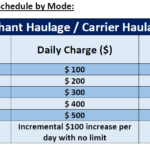China’s Covid Zero Policies Worsen Supply Chain Problems
If you’re interested in prolonging the world’s supply chain woes, follow China’s example. With its Covid Zero policies, China won’t allow crew changes for foreign crew on ships and imposes ridiculously long quarantines – we’re talking close to two months – on returning Chinese seafarers.

K Oanh Ha and Jack Wittels report in a Bloomberg article:
China’s increasingly extreme Covid Zero policies are standing in the way of a full recovery for the shipping industry and prolonging a crisis that’s snarled ports and emptied shelves worldwide.
In its attempts to keep the virus out, China’s continued to prohibit crew changes for foreign crew and recently imposed as much as a seven-week mandatory quarantine for returning Chinese seafarers. Even vessels that have refreshed their crew elsewhere have to wait two weeks before they’re allowed to port in China.
To comply, shipowners and managers have had to reroute ships, delaying shipments and crew changes, adding to the supply chain crisis. “China’s restrictions cause knock-on effects,” said Guy Platten, the secretary general of the International Chamber of Shipping, which represents shipowners and operators. “Any restrictions to ship operations have an accumulative impact on the supply chain and cause real disruptions.”
There are many bad Covid policies in the world, but China’s may be the worst while the country is a key cog in international trade, as the Bloomberg article also contains:
The world’s biggest exporter, China is a key hub for the shipping industry. It is also the last country to hew to a Covid Zero policy, with increasingly radical measures. In recent weeks, authorities locked in 34,000 people at Shanghai Disneyland for mandatory testing. A Beijing school held primary school children overnight after a teacher tested positive. The definition of “close contact” now extends to people separated by as much as a kilometer.
There’s nothing like fear and authoritarianism to lead to bad policies. Obviously, there’s no science to back up close contact stretching out to people a kilometer away from each other. There’s no science to justify locking thousands of people in an amusement park for testing or locking children in a school over a single positive test from a teacher. Likewise, there’s also no good science to China shutting down a major port terminal over a single positive COVID test, but that’s another move the country made a few months back that negatively impacted the world’s supply chain.
As bad as terminal shutdowns, like the one mentioned above, are for international shipping, these restrictions and quarantines on crew are even worse. Huileng Tan reports in Business Insider:
Seafarers typically take a break from sailing after four to six months onboard, according to the International Maritime Organization.
Most seafarers in the world come from five countries: China, the Philippines, Indonesia, the Russian Federation, and Ukraine. Before the pandemic, seafarers would sometimes have to head to another country to board a ship. Likewise, some would disembark in another country before making their way home on a plane, which has already been made increasingly difficult in the last two years due to border controls.
The staff swap exercise for Chinese seafarers has become increasingly difficult “due to stricter Chinese Government isolation requirements on seafarers post sign off and prior to repatriation,” the not-for-profit Global Maritime Forum said in a recent press release.
This means ships are rerouting to work around China’s restrictions, prolonging shipments.
The Bloomberg article gives a taste of how delays and costs add up from China’s restrictions:
“We’ve had vessels that ran into demurrage” — late fees — “we’ve had instances where we had to deviate, either before we call China, or after,” said Eman Abdalla, global operations & supply chain director at Cargill. “There are instances where the delays are within hours, but there are also instances where the delays could go on to days.”
Euronav NV, one of the world’s largest owners of oil supertankers, has spent an estimated $6 million handling disruptions related to the crew change crisis, including the likes of deviations, quarantines and higher travel costs.
“In the past, it was pretty nice to do crew rotation when we were in China,” said Chief Executive Officer Hugo De Stoop. “And now basically it’s not possible.”
For seafarers, the kinds of quarantines they’re facing to go home are not just ridiculous, they’re brutal.
The latest restrictions at China’s ports target Chinese crew, requiring them to quarantine for three weeks before their return to China, then another two weeks at the port of arrival, and two more weeks in their province before they can reunite with their families, according to Terence Zhao, managing director of Singhai Marine Services, one of the biggest Chinese crew supply agents.
…
Even seafarers with emergency medical needs aren’t allowed to get care in China, ship managers said. An Anglo-Eastern chief officer with a severe tooth abscess couldn’t get off his vessel for treatment. The ship had to divert to South Korea before he could see a dentist.
…
Ship owners and operators also acknowledge that they are managing China’s restrictions by shifting the burden to the workers on board. Chinese authorities won’t allow more than three Chinese seafarers on a flight to the mainland, so their return home can be stretched to months after they’ve signed off from vessels, said Hojgaard.
Anglo-Eastern said as of this week, 555 out of its 16,000 active crew are overdue for relief, and nearly 60 have been on ships for more than 11 months, the maximum mariners are allowed by international law to be on board. “We are trying our best to get them off but can’t,” said Hojgaard.
I have a bunch of jokes about trying to get seamen off but being unable to do so, but the situation is so bad, I can’t bring myself to include them. Unfortunately, this situation does not appear likely to end soon as the Bloomberg article says, “This month, China’s coronavirus czar defended the nation’s strict covid measures and signaled there wouldn’t be an easing of rules.”




